Joseph Wilson, hangman, a local man from local lineage, many of his family to be found in St Bridgets Churchyard in Brigham, is found dead, presumed to have drowned himself from Cockermouth bridge.
“It is a job. People need jobs. People need to be safe. I am helping people to be safe…
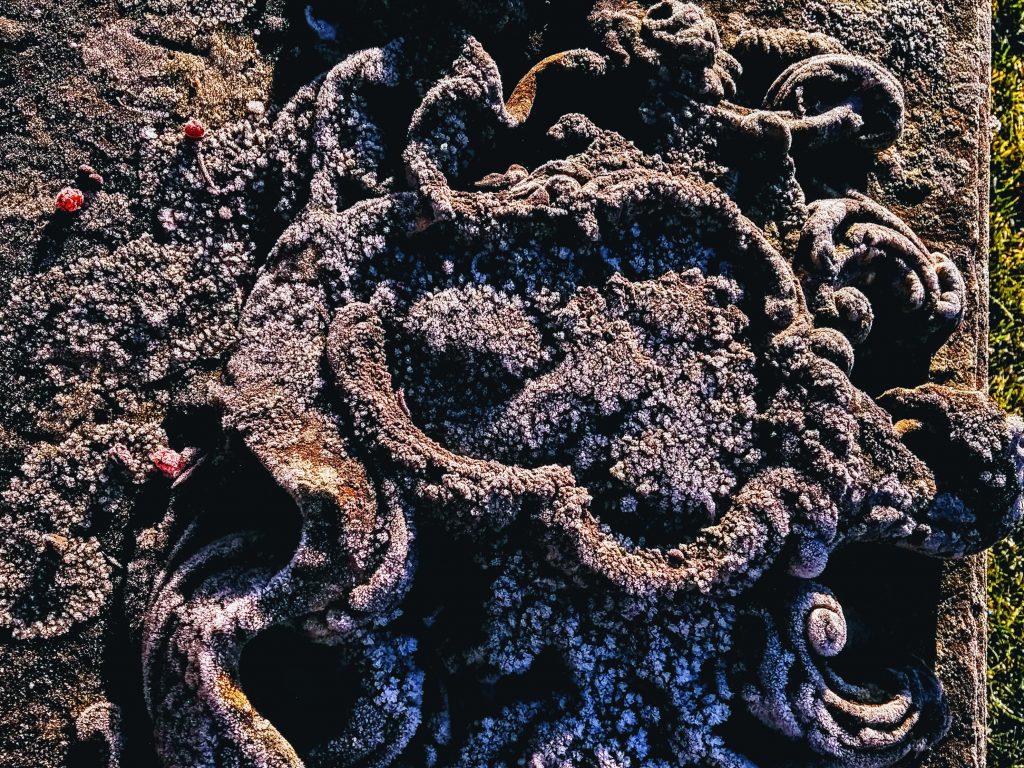
…I am helping this person to meet his eternal maker for stealing some food because I am helping people to be safe. I need to keep telling myself this, need to, for my own sanity, before something inside me breaks, can’t bear the horror of myself anymore and then where will I be?
I fear it will not be Heaven waiting for me after what I have done.
How he struggles, how he looks at me, like I can help him. He is crying, a small underfed boy, a boy, no matter how he was so sterny flanked on the way to the scaffold. He has brown speckled eyes and I am the last thing he will ever see. Is that a hopeful gap-toothed smile, pleading, thinking I somehow have to have the power to save him, to stop him dying? Even though I am about to kill him.
He still doesn’t believe it of course. I try to look into those rolling terrified eyes, like a cow on the way to slaughter, eyes like that should be calm and trusting or excited and bright. It should not have to be like this.
I try to reassure him even as I put the hood over his head, he tries to grab or hold my hand but he is in cuffs too heavy for his frail wrists. His hair is so soft and downy, so babyish, even as he hangs between life and death I recoil at the thought of it still.
Then I push him. He is a child. He thought I would help him until the last. People like me are meant to help. Bad people kill.
I am sorry. I hope he will be quick but he is light and thin, the worst outcome. He dies for a long time. I remember his eyes and his hair when I go to bed and in my dreams he now recoils from me, me who feels for his plight, his hair so soft, his terror and the way I did this, I did this. I am sorry.
Now again in my disrupted sweat sodden half- sleep, the hideous jerk and recoil, I think he is finally done, then another hideous thrash again, his head staring up, his hair now coiling sweat drenched snakes. Is he looking at me? I am sorry. I tried to do my best.
What a long long time he took to die.
I take my payment, the coin cold in my hand and try to think of its use. His mother rocks backwards and forwards, she too then finally silent.
I must do the same next week.
I am helping people to be safe.
I must do the same next week. “
Suicides are not meant to be buried in consecrated ground.
However Joseph, a man from the area, was buried with his family under the same sod in 1757.
Maybe it was an accident, a good man from a good family with a good occupation does not die such an unnatural death. Maybe he was just staring at the waters, contemplating, leaning to stare at some interestingly vague flotsam and then… a tragic accident. No-one saw him go and he left no note thus he was allowed to reside in perpetuity with his departed family in St Bridgets.
He was said to have been depressed and miserable about the job he had to do but who would not be? He had family in the area and a family grave so best to pretend that it was an accident, to leave the dark graves on the north side of the church to the poor and the unknown suicides.
His grave was adorned in stonework of a coiled rope, the rope he used to hang his victims, the stone noose gradually chipped off as an exciting souvenir, a thing to show someone else. People have always been grotesque. One suspects Wilson would have been unhappy at this adornment of his grave, his value in death reduced to the miserable job he had in life.
It does of course get worse.
Because poor dead Joseph Wilson still did not sleep well.
A spectre of a hanged man, a noose around his neck, tongue grotesquely lolling appears to a local farmer near the graveyard. Other spectral forms said to belong to Joseph are said to have unhappily flitted around in this ancient graveyard until 1860. At this point, the local sexton, clearly having had enough of such ethereal nonsense in what was meant to be such an eternally peaceful place is said to have dug up Joseph’s grave.
He secretly deposited his skull back in his old home, now belonging to two sister/brother clog makers, depending on what old narrative you are reading. I have thought about this detail a lot but I still do not know for sure how one can secretly deposit a skull in someone’s house
‘Hello dear ladies, gentlemen, just making a passing call!’
( He attempts a jolly tone, it is not a tone he is used to and it would not be one at all wanted in his usual position)
‘Oh hello, Sexton, isn’t is a terrible/lovely day?’ ( said pleasantly whilst looking sidewardly at each other)
‘Oh indeed, it is, now might I trouble you to use your water closet? So sorry to inconvenience you but nature has unfortunately called at a most inopportune moment.’
‘Why of course you may’ (said after looking at each other in a vaguely alarmed way) ‘but do not take your bag with you, it looks somewhat unwieldy and the room is small, do leave it here’.
They have known the Sexton for a long time but the elderly know they can be preyed upon by the most unlikely sources and there is the good pottery upstairs.
Both brothers/sisters are also thinking of graveyard smattering upon their neatly brushed tiles, the detritus of death in tiny earthy pebbles upon their landing.
No, best if the bag and all it symbolises stays downstairs.
‘No, no, it is of no bother to me, I scarcely feel the weight of it anymore,’ he says, deliberately missing the point, the firm English politeness is a wonderful thing at times.
Then he goes upstairs.
‘Quite curious, do you not think, dear brother/sister? ‘
‘Yes indeed but hush, I fear he may have lost his way.’
They listen in silence to the sound of the floor creaking heavily and frequently overhead, backwards and forwards, look at each other poised between nervousness and embarrassment, that quintessentially English trait.
It took him a long time to visit the loo, they agreed afterwards. From the complaining of the elderly wooden boards it almost seemed as if he had never actually visited the bathroom at all but instead have moved of his own free will across the upper floor.
What do you say to the person who will not so far in the distant future interr you when they have seemingly roamed across your house?
You both smile brightly when he comes down, absolutely agree with the fact that it is hard to work out where the bathroom is and you both notice that his bag appeared emptier but you never talk of it, not even to each other. You do not want to worry, to cause concern.. It is the only secret you ever kept from each other and you both so dearly wanted to talk.
You both agree that a lingering unpleasant smell for a few weeks is down to rats, you both think the sexton had something to do with it but it doesn’t seem like a nice thing to talk about. You don’t want to worry each other.
You try not to think about who once lived in the house you now consider yours. Everyone knows of course and you hope they don’t talk about it.
Not a pleasant business when all is said and done.
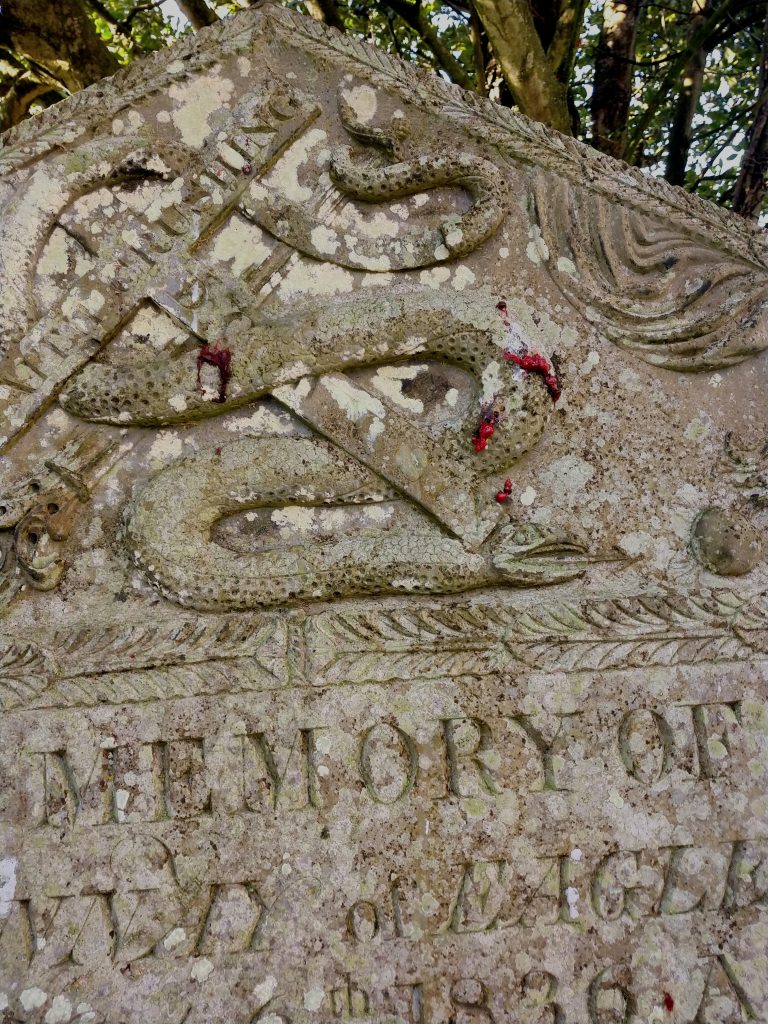
After the eventual demise of the clog makers, the grisly relic of the hangman’s skull is discovered in an old old box in an old old cupboard.
A precursor of the Funnybones books but ever so slightly darker.
History does not relate what happened to the skull after that.
Such excitingly foul and ancient relics found in time-warped cupboards are sadly of a timeline now ended when houses are deep cleaned by abrupt, uniformed staff from house-cleaning agencies. There are no dark nooks and crannies in scoured clean duck- egg blue slightly chipped MDF from Ikea, nothing deep and dark enough to hold a skull covered in graveyard earth.
One has to miss those good old days, when Narnia can be in an old cupboard. A hangman’s skull secreted somewhere deep within old crevices, where old treasure, secrets and history still lurk, relics of an invisible past waiting to be discovered.
–
Some vague sources state that the remains of Joseph’s victims lie buried in Brigham Churchyard but it would seem surprising as the people hanged upon the scaffold did not even have the thought of a grave to be close again to their loved ones in their local church, still a faithful someone to believe in their innocence or forgive their trespasses to lay fresh flowers upon their grave, remove weeds and to remember the person and not the deed.
Another death within a death, the knowledge of whilst waiting to be killed, surely the most psychologically traumatic thing to ever happen to a person, that even after the dwelling upon how long it would take to die, how excruciatingly painful, how many people would be there to watch and bay for blood and cheer ( something finally outlawed in 1868) the thought there would be no Christian burial, just a body laid in quicklime still outrageously in prison grounds, a mass common grave of the evil, the unfortunate, the desperate and the innocent. No respite for an immortal soul in such a death as this, even if you were unblemished by nothing but heresy and rumour.
There may even be a party of medical doctors, so keen to experiment upon a fresh corpse that you might even be warm when your bodily secrets are opened up.

In the nineteenth century, they may well be more keen to measure your head. God Bless Progress. Phrenology is a new and exciting idea and the most eminent of people talk about such things nowadays in the dying days of hangings. Uncalloused refined hands will now finally gently caress you now you are dead and finally of worth. They will look for signs of delinquency on every bump on your skull, the skull you cradled in your now lifeless hands before the sun rose on this same morning.
What a way to go. And imagine if you were innocent? A story from Lancaster- a man found tied to a fencepost and angrily denounces the criminals who did such a thing. They are found and duly trialled. Some are sentenced to deportation but the ringleader cries out his innocence until his throat is silenced at the end of the long drop.
Then the so-called ‘victim’ of the crime is found out to be a liar,has done the same thing before. But too late for the innocent man who will never get an apology for hs state-sanctioned murder, now buried under the shadow of the castle. What torment could be worse than being an innocent god- fearing person who has always done good by his neighbour but waiting, waiting, that final climb on shaking legs up the stairs to the scaffold; about to be killed in front of your horrified family whom you have now inadvertently ruined and delighted strangers, out for a jolly good show, some cracking entertainment. The richest to the poorest used to love a good old-fashioned hanging, the more well- off paying well for a vista of the scaffold from a house nearby. That way they might even leave with their pocket watch intact as well as being able to witness the final anguish from an excellent viewpoint.
N-one believes you but God and your faith in God diminishes as you slowly choke to death.
Sadly when researching this book, many other miscarriages of justice were found appertaining to just Lancaster Castle, a smallish castle but particularly violent, second after London for its state-sanctioned murders. There’s something for a small provincial city to be proud of, their hats might not have been of the newest and most fashionable materials but their castle was renowned for instilling strict justice. Lancaster Castle excelled in misery and held unhappy prisoners (including the Guildford 4) until 2011.
At the time of writing it is supposably now being modernised to include a new boutique hotel. History makes fools of us all.
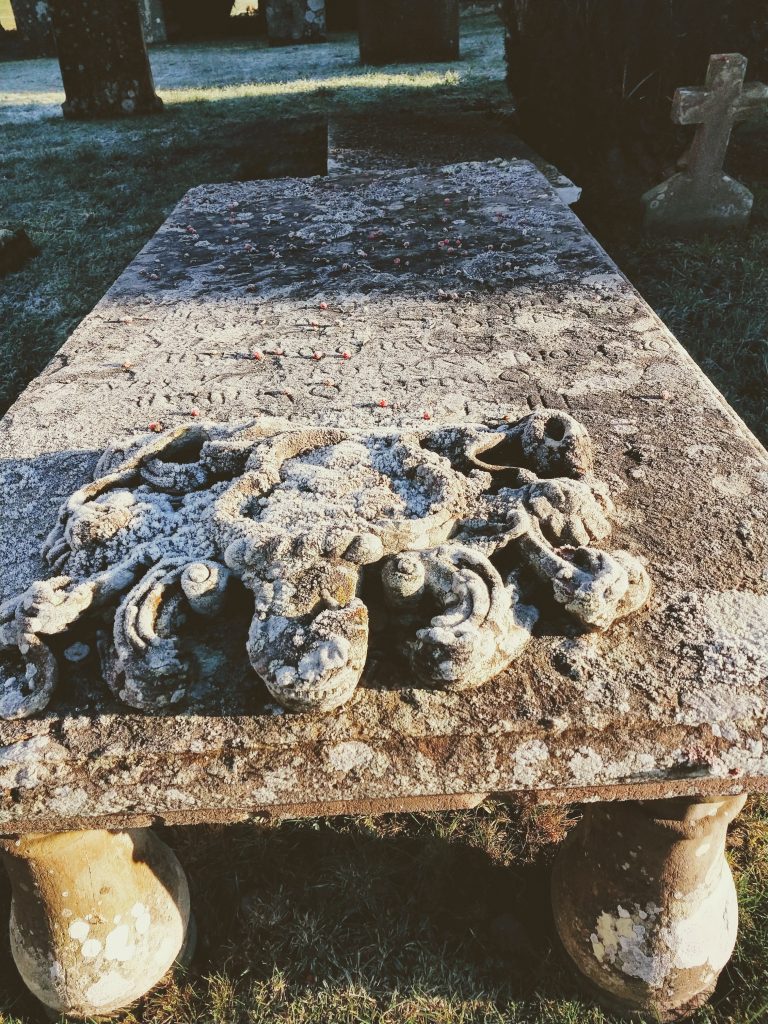
Back to Brigham.
This old graveyard has more than a mere ghost of a hangman. Along with so many other ancient graves and crosses, it has another grave connected to another legend, featuring a great historical story that became a novel and then the film that eclipsed them all.
The Mutiny Of The Bounty
This is a book- or film and one of the few cases where the most renowned version of the film is better than the book of (surprise!) mutiny, death, betrayal and lots of sweaty muscled torsos being lashed by whips with Fletcher Christian being played by Marlon Brando.
The story is even more surprisingly true, or at least based upon truth depending upon how much you believe.
Fletcher Christian, the hero or anti-hero from the book was from the local area and born in 1764.
He lived in Moorland Close, not presuming from the name, a small road in a Barrat estate but what I originally presumed to be a farmhouse and piel tower from the description “a quadrangle pile of buildings … half castle, half farmstead.’ A look at photographs pertaining to his house however shows nothing but the aggressive sprawl of an agricultural farm, no closely attached Piel Tower to save the residents and their animals from the marauding Reivers from the closely disputed boundary between Scotland and England but an impressively towered summer house may well be the source of such narratives.
Recent owners of this farm on a windswept coast that is mostly noted for the proximity of Sellafield were somewhat distinguished to have had Mel Gibson scrabbling around on their roof somewhen in the 1980s.
This is not a regular occurrence on the North Cumbrian Coast.
He was apparently looking for the alleged autographed footprint of the young Fletcher Christian on the roof of the summerhouse that formed part of his home.
Thus in the local paper, appears the best photograph of delighted farmers on the North Cumbrian Coast who have found Mel Gibson on their roof that I have seen at this point in time. This roof scrabbling by a famous Hollywood star was due to him appearing in the fifth film featuring possibly the second most famous shipwreck in history.
Christian’s formerly rich but suddenly impoverished family was apparently due to his mother’s poor way with finances and this is a reason why he took to sea along with the rejection he suffered when his cousin Isabella rejected his advances. Maybe he thought he could earn enough, become enough of a man to finally change her mind.
He then became infamous for his seizing of the command of The Bounty from the sadistic Captain Bligh and a worldwide legend was born. It may well not have been if a woman near Cockermouth did not purchase beyond her means or a girl had acquiesced to marrying her cousin.
Do watch the original film if you can; it is a true British classic, a black and white film of hideous brutality, class war and heaving manly bodies. There is another longer American production if you want three hours and five minutes of whipped torsos in lurid colour. The black and white edition is the best and most enjoyed on a rainy bleak winter afternoon washed down with a good red wine and no company.
The mutiny in 1779 some say was due to the sailors not wanting to leave the exotic climes and their new beautiful girlfriends of Tahiti and travel the long dangerous way back with their cargo of breadfruit back to a far darker and less exotic England after finally finding Paradise on earth. They had spent five months there, five months is a good time to lose yourself in. Think about how many people have decided to leave their jobs, friends and family after three nights in India/Spain/Ryll.
Some say it was their fear of Captain Bligh and his harsh control, his way with the whip. After touching heaven on an idyllic island, becoming a man, finding love or at least great sex, who would want to go back to kowtowing and yes-siring?
They kept quiet, they knew their place but the island kept sliding away, the place where they had actually felt happiness and equality, warmth and worth.
The mutiny happened 1,300 miles away from Tahiti apparently led by Fletcher and caused by more appalling treatment from Bligh towards his briefly liberated less servituded crew.
Eighteen mutineers and Fletcher, a sudden human storm on a big ship and then Bligh left jettisoned with a loyal or just scared eighteen members of crew adrift in a small boat in the middle of an ocean.
Like Schrodinger’s Cat, did the mutineers ever think the evil Captain would survive or did they think they themselves were innocent, they had not killed but simply removed?
Bligh spectacularly survived, the evil ones often do and amazingly made his way back to England to tell his tale. There are those amongst us, reading this who freeze in terror when we have forgotten our phone when going to work. Bligh, penniless and adrift in the eighteenth century managed to blag his way from a small boat a thousand miles away from Tahiti back to the metropolis of London to seek his revenge and his former place in life.
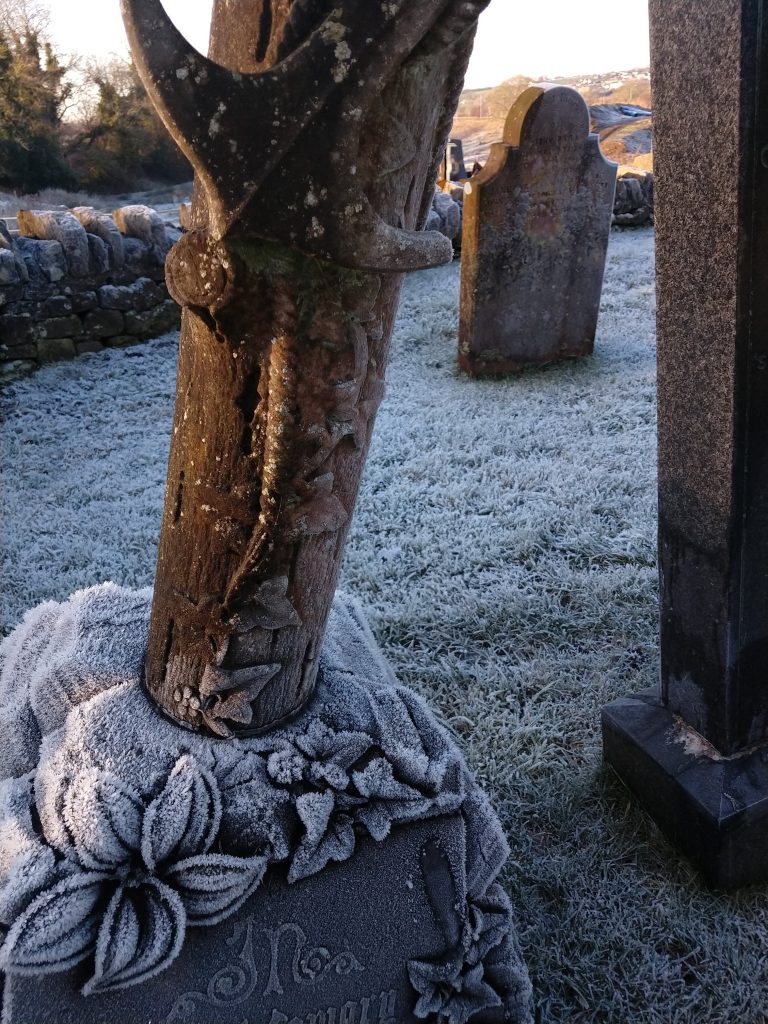
So back to our small local graveyard in Brigham, Cumbria, back to the legend of Fletcher Christian.
The historical narrative is that he and his small party of mutineers landed on the Pitcairn Islands, a place so off the not yet existing radar that they thought they would never be found, after an ill-fated settlement on a more aggressively populated island where one crew member was killed.
Then to Tahiti, where several mutineers decided to stay and where Fletcher ‘married’ one.
But then some remaining outlaws from the Good Ship Bounty including Christian, sailed further on to the remoter safer Pitcairn Islands, their shipmates now including male and female Tahitians where the splendid, expensive and mighty Bounty, the result of years and years of work by dedicated ship-builders, her body made from prized ancient oaks, was set on fire, scuttled to remove all obvious traces of their landing.
How did they feel as they watched her burn? No way home now. No way to ever contact their family again.
They knew they would be wanted men now despite their distance from England. They had risen up against a Captain and no-one liked an insurgent, no-one would pity someone who stood up to the prevailing class because the class system was there for a reason and those who fought against it were inviting anarchy and thus more anarchy, like a hideous pox, might appear. Those who fought against the system were tried and condemned by those who had the most to lose by a breaking down of class and thus were tried most heavily indeed, a warning to others to keep your head down and behave. Or else. Not to mention the deliberate burning of an expensive and mighty boat that did not belong to them.
Lost on a small island, the issues surrounding the now enslaved Tahitian men and the resulting sexual tensions between the men and the women led to a further insurrection. It seems that those who rebelled against the cruel treatment by Captain Bligh were more than happy to subject slavery and misery to others if they themselves could now be the ones in control. The women they left as presumably less dangerous and far more prettily pleasant as wives or girlfriends.
They had their comeuppance when the slaves escaped and killed their enslavers, apparently including Fletcher Christian, the ringleader of this band of miscreants who sailed in one sunny day into Tahiti and caused so much havoc and disarray in a small tropical paradise.
That and the tropical climate meant that when The Topaz happened to visit in 1808, only one original mutineer was left alive. John Adams (otherwise known as Alexander Smith when on the Bounty) along with nine Tahitian women and children who resulted from the sailors’ interaction with the Tahitian women.
Fletcher Christian supposedly died in many ways and on an island such as this and so many hundreds of years ago it would be surprising if he had not. His various deaths are attributed to suicide, natural causes and insanity along with murder.
However, the rumour mills for century to century, even without the new devil of the internet are not slow and there have been many rumours that Fletcher Christian somehow scarpered from this remote island, was able to reach England again and then finally found his way back to this small corner of the Lake District, finally back home but too scared to reach out to friends and family as was known for being an outlaw and the resulting death penalty that came with it.
He was said to have been seen in neighbouring woods, was reputed to have been seen visiting his aunt in the local area and there is a legend that he was surreptitiously buried here in Brigham Graveyard near his mother’s grave where he was also said to have been seen. So it is said.
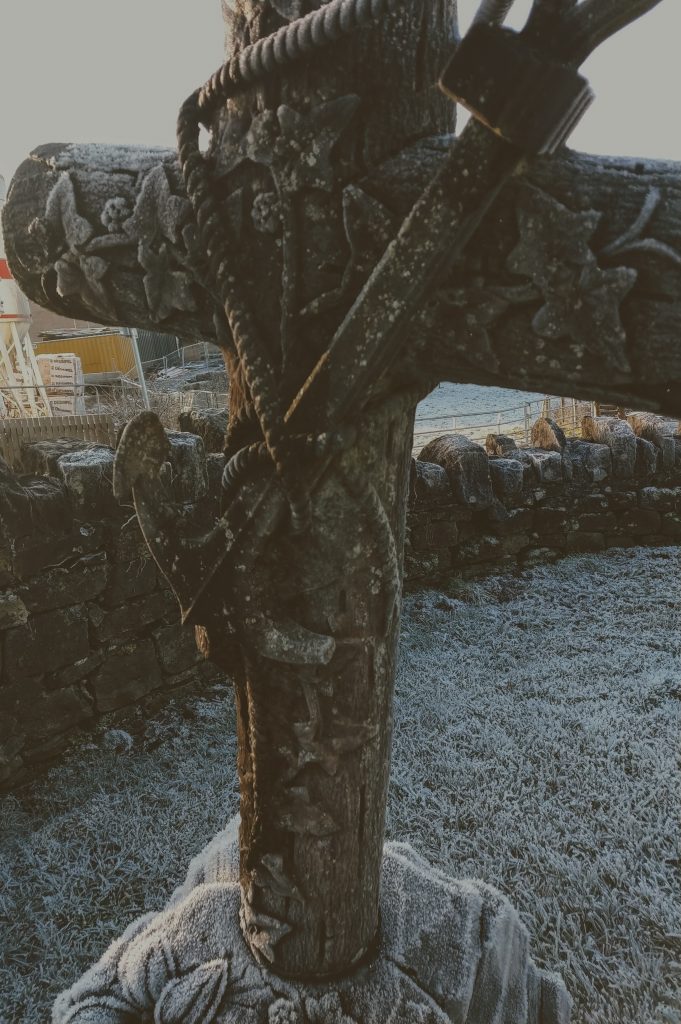
His childrens’ relations and those of the other mutineers still reside on Pitcairn Island and in many other places across the globe.
Another survivor of the Bounty was Peter Heywood who Captain Bligh named as a traitor and a mutineer along with Christian Fletcher despite the fact that Heywood had settled in Tahiti and not continued to the Pitcairn Islands.
In 1791 the surviving crew there were met by the HMS Pandora, indeed paddled out to them in delight, so happy at a chance to go home again, despite the tropical idyll they now resided in. Maybe they had discovered the downside of such a place, the mosquitoes, the tropical storms, the dentistry and now thought of rain drenched moors, their families and a snowy Christmas.
Instead of a welcoming party holding out a three month copy of the Daily Times so they could learn all so much that was new, they were put into chains and thrown into a hold, accused of mutineering.
As if this voyage had not been enough, The Pandora itself was then wrecked off the Great Barrier Reef in Australia and the other four prisoners drowned. Such a story to never be able to tell your family.
Heywood somehow survived but then was sentenced to hang upon his return to England. This man having more lives than a litter of kittens however was pardoned and set free, maybe due to his connections to rich and influential people, the class system again looking after its own whilst casting others out to the lions.
But why are we talking about him? Heywood was insistent that he saw Fletcher Christian alive in Plymouth, the international port of Plymouth (see where this narrative is running?) He recognised his stance, the back of his head, went to move after him but the man turned, looked behind and ran.
Fletcher can’t have left the Pitcairns, the ship was scuttled, gone, burnt. But what of the ship’s cutter, the boat used for light loads? Or was that used on the ridding of Captain Bligh?
What of the gold onboard the Bounty? The small island landed upon has been subjected to much rigorous digging and development in the following centuries but nothing has ever been found.
Why no grave on Pitcairn Island to him? It is said that the remaining Tahitians held up the skulls of their husbands and all five were all of white men so this supposed that Fetcher’s skull was amongst them- but could the casual observer really tell one skull from another of a different race or sex?
Many local links are entangled in the narrative since his supposed death. He had been apparently seen at Windermere, near Belle Island where his beloved Isabella now lived with her prominent Whig husband, a man certainly able to cover up any subterfuge with his influence in parliament and his great riches.
One more thing ( I promise) -Fletcher Christian went to school with William Wordsworth.
After Fletcher’s presumed death on Pitcairn Island, a pamphlet came out describing the events on the aforementioned island that led to his death. Wordsworth was quick to say that the events related were untrue and he had the best possible knowledge of this. Many minds were quick to presume that Wordsworth, a poet living in Windermere and a man well known to Fletcher who was said to lurk undiscovered and in fear of his life nearby might have indeed have close hand knowledge of how the facts were untrue but was unable to say why in case he incriminated a man who was known to be dead but certainly would die again if his second life was discovered.
All superstition, conjecture and legend, all lost in time. It would be amazing if Fletcher Christian had ever left the danger and misery from the thwarted paradise of the Pitcairn Islands, a place where beauty held sway but so did men’s entitlement and greed, even when no money, greed over women, greed over power, the greed of a supposed superior race causing a new insular war in the middle of the Pacific Ocean, a new slavery, new betrayals from the whites who some had just started to trust.
But then again no-one ever expected Captain Bligh to appear again from the middle of a swirling foreign ocean where he was placed and arrive again in England, a Captain, once again.
A quiet place, Brigham Graveyard. I went there on a winter’s day, snow and ice making the stone slabs crystallised and blank, impossible to find or read story underneath. The invisible dead becoming new again, unsullied, white and beautiful.
In the new part of the graveyard,a bent old figure slowly carefully moving through the white to place down a splash of colour in cellophane on a new grave.